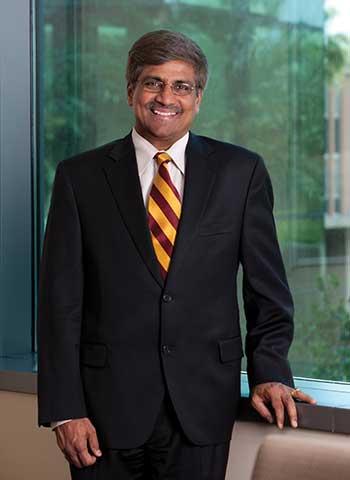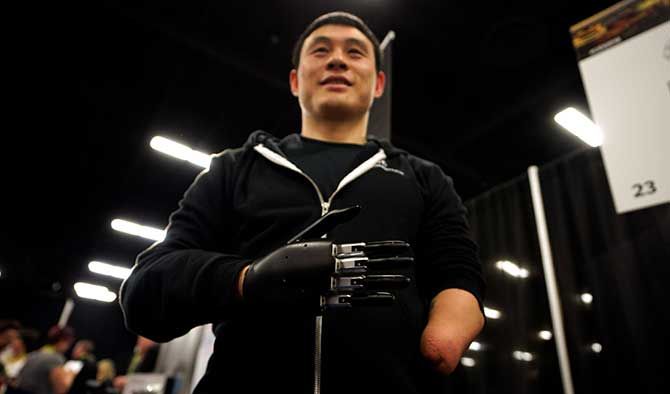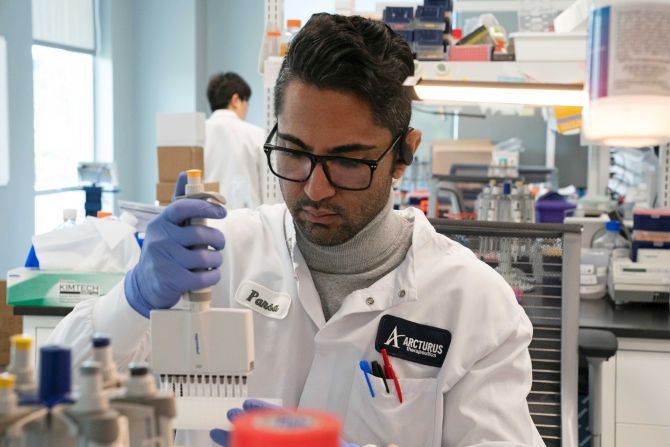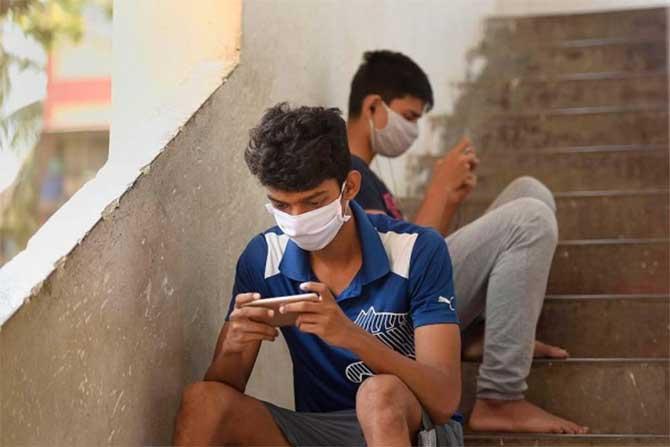'Everybody says 5G and communication is important.'
'Everybody says automation, robotics, human computing interfaces -- people and machines working together -- is the future.'
'Everybody agrees that cybersecurity is something that is here to stay.'
'Everybody agrees that synthetic biology is important.'
'Instead of outlining thinking about industries for tomorrow and the future, let the evolutionary pathway be built in a way that it promotes robust, creative, thinking.'

In times where the political divide is particularly wide, Dr Sethuraman 'Panch' Panchanathan raised eyebrows when he got unanimous United States Senate confirmation to head the National Science Foundation.
He became the second Indian American, after Dr Subra Suresh, to head the organisation that supports fundamental research and education in non-medical scientific fields.
Though first appointed to the National Science Board by then US president Barack Obama in 2014, he was picked for his current role by President Donald J Trump.
Dr Panch's research areas are in multimedia computing, human-machine interfaces, machine learning for multimedia applications, medical image processing, and media processor designs.
He has more than 400 research papers to his name, and chaired various conferences and was editor-in-chief of the IEEE Multimedia Magazine.
Among other accolades he has earned, Dr Panch is a fellow National Academy of Inventors, a fellow at the Institute of Electrical and Electronic Engineers, a fellow of the Society of Optical Engineering.
When Dr Panch, who was Arizona State University's chief research and innovation officer, ran its Knowledge Initiative, the university was named the most innovative university for five years in a row by US News and Report.
 IMAGE: Dr Sethuraman Panchanathan.
IMAGE: Dr Sethuraman Panchanathan.The professor did his BSc in physics at the University of Madras in 1981, his BE at the Indian Institute of Science in 1984, his MTech at the Indian Institute of Technology in Madras in 1986, and earned his PhD from the University of Ottawa in 1989.
In this exclusive interview with Rediff.com Senior Contributor in the US, P Rajendran, Dr Panch discusses his three pillars for his tenure at NSF and his plan to drive collaborative efforts to make them work.
How do you feel being picked to be director of the NSF?
Very exciting, very thrilling.
It's a wonderful time to take on the leadership at NSF.
NSF will always be, and always remain the leading light in scientific and technological research, exploration and discovery, not only in the United States, but around the globe.
Therefore, being able to take on leadership roles there is truly an exciting and humbling opportunity.
In fact, you know, Rajendran, maybe we have a different point of view there.
I feel there is a tremendous amount of support both from the administration side as well as from Congress.
Look at the Office of Science and Technology Policy [in the White House] and [what] Kelvin Droegemeier... has been doing as the science advisor to the president, it's very, very clear that science is, in fact, a very high priority in fact.
Scientific integrity, scientific collaboration, the global process and the spirit of collaborations -- all of that is of high relevance and importance in this administration and in the past administrations also.
If there is something that binds the (Democratic and Republican) parties together, it would be science and technology, and what it contributes in terms of not only lifting the human spirit, but also resulting in economic and societal development.
The proof is simply there.
If you look at my own nomination being confirmed, it was unanimous. There was no question about the fact.
They know I'm a scientist and they all feel pretty strongly that a good scientist, a respected scientist, should be the leader of the National Science Foundation, and that such a scientist will not only advance the frontiers of research.
I've been very up front. My three pillars indicate what my priorities are.
(The first is) that I want to advance the future of research in a very vibrant, robust way.
The second thing is I want accessibility -- that talent is everywhere across the nation -- in rural areas, urban areas, it doesn't matter West Coast or East Coast, the heartland, or down in the southwest where I used to live.
Talent is everywhere, in every community. How do you bring the talent out?
It is an exceedingly important imperative for the nation to be successful.
The third one I have emphasised is global science leadership... NSF has always been a leading light, and I want us to be seen as a highly collaborative enterprise at the same time as leading with scientific values, leading with integrity,
leading with the conduct of open, transparent research at the same time.
How do we do those things that then each of us takes the outcome from the research and see what it means to the development of our industry, entrepreneurship, economy, etc.
So the innovative mindset that is there across the nation is bipartisan...
I testified to the [Senate] Commerce Committee last October.
The majority and minority [party] staffers told me how much they respected my views, and how much they felt this was what was required.

In these fractious times, where science often is seen in terms of party, how do you navigate the political shoals?
I'm sorry. I have a different point of view from my own experience rather than what I read in the media.
I have found a lot of respect and regards, and the [view] that research is important, ... science is important, ... that STEM education is important.
If you look at the industries of the future -- AI, quantum [computing], 5G, automation, cybersecurity, strategic computing -- they are priorities of not only the administration, but also (the US) Congress.

You have a degree in engineering...
My first degree was in physics.
I started with science, and from science I gravitated to applied science engineering, which is what the electronics and communications engineering degree from the Indian Institute of Science was all about... My engineering background comes with a strong foundational science base.
I carried that on to my master's programme that was in signal processing, multimedia and so on.
Subsequently, in computer engineering in my PhD, and in computer engineering as a faculty member, I always ... joked around that I started with atoms, and now I do a lot of work on neurons: My cognitive computing (work) is all about neurons.
I am a strong believer in the fusion of intellectual disciplines -- and there is a lot of inspiration that can be mutually garnered, what we do in one discipline motivating stuff that happens in others.
What are your priorities in the next six years?
My priorities are going to be centered around the three pillars I talked about.
Closely aligned are the National Science Board's Vision 2030 (external link) document.
As part of the National Science Board, I was part of the formulation of the strategy.
We're going to be doing a lot of things that aligns with the Vision 2030 document, which I believe is an excellent framework.
There are other things that can be done to make that a reality, the most significant of them being partnerships.
I'm going to work very hard at fostering fundamental research at much larger scales.
At how to take fundamental research concepts and work with partners, like industry, like foundations, like philanthropy, like states ... How to get the maximum impact in regions and communities across the nation.

So not so much basic research, as the applications end of it?
No, it's a lot of basic research, because who we are at NSF is about basic research.
What I'm saying is that basic research outcomes -- some of it -- can impact societal development outcomes.
In my research, I've worked on the problem of how to get accessible interfaces designed for people with disabilities to be successful.
I'll tell you, if I'd continued with my normal course of research, I would not have been solving some of the fundamental problems in computer science and engineering I'm solving today.
When you try to solve a complex problem, you say, oh my god, existing tools and approaches and scientific theories are not enough.
I need to go back and recreate or rework get new stuff.
So I solved some problems that I would have never solved, and I call them incremental versus transformational journeys.
Not that one is better than the other.
What I'm saying is, it gives you an opportunity to expand the scope of your basic research also.

Is there always a utilitarian aspect to the research?
No. One thing is how science benefits humanity and society. [For example] we have covid today.
If you look at all the scientific work that has happened in genomics, proteomics, infectious diseases, computer science, engineering even, they play a big role in trying to address this humongous problem in front of us.
If we did not have the base of research, we would not have [some solutions] today.
Utility is not the focus; it is research at a scale that has the potential for utility.
You don't have to wait for a pandemic to do that; you can do it through partnerships.
Our industry partners [seek] the Bell Labs-like activities of the past.
The transistor did not happen just like that.
It happened in Bell Labs because they did it as pure, exploratory research that gave us the devices [cellphones] that we carry around now that would not have been possible earlier.
What I'm saying is that those structures can be replicated at scale if you have strong public-private partnerships.
That is not only translational or applied research.
So don't look it as a spectrum.
You don't just say, you do basic research, then you take it as applied research, then you develop a product.
It's not a linear pipeline.
We all know that if there is a problem in 5G that cannot be solved -- security being one of them, privacy being another -- you have to go back to basic research to solve them.
Some of these problems are intertwined. It's not just a feed-forward mechanism, it's intertwined.
So there will always be -- and that is the mainstay of the NSF -- fundamental, curiosity-driven, discovery-based research. Period. That's it.
But how that gets modulated can be by a true spirit of innovation and discovery from people from within, or inspired by other people in the realm they further want to advance, or it could be a societal problem or challenge -- like how do we get potable water to all the citizens, a pandemic that [has a researcher] come back and says we have not solved the question.
Or industry saying it needs to work in quantum [computing] but doesn't have all the theories and the fundamentals to build a quantum device.
So now you are allowing your inspiration [to come from] other realms.
Where do you draw the inspiration from?
Through new public-private partnerships, we can draw more inspiration from, be more responsive to, and be more available for all these things that require the fundamental, core research prowess that NSF funds.
People often misunderstand this as [meaning that] NSF is now probably going into applied research.
[But] NSF has always ... been doing work that actually had an outcome.
Yes, I can see it as perhaps both a continuum and a network between fundamental and applied research.
Right. Exactly. That's a good way of saying it.

Going by what you've said, tentatively what projects do you have lined up?
I don't think it should be a director who should be saying this is what we are going to work on, right?
Having said that, let's take the industries of the future. AI -- everybody says AI is important in every facet of our society.
Everybody says 5G and communication is important.
Everybody says quantum is the next thing we have to work on actively.
Everybody says automation, robotics, human computing interfaces -- people and machines working together -- is the future.
Everybody agrees that cybersecurity is something that is here to stay. We need to keep advancing computing strategies.
Everybody agrees that synthetic biology is important.
People say the manufacturing that we have done traditionally in big manufacturing houses to the PPEs (personalised protective equipment) printed at home with 3D printers. Manufacturing is evolving and morphing.
These are all priorities laid out by people who have spent a lot of time thinking through the strategic priorities for our nation and the globe.
Instead of outlining what you are thinking about industries for tomorrow and the future, let the evolutionary pathway be built in a way that it promotes robust, creative, thinking.
In other words, how do you spread the innovative mindset across the nation?
How do we get STEM talent?
If you look at the STEM talent in our nation, it's resident in every part of the nation.
If you look at the international talent coming in -- like myself -- [it is] augmentative, not substitutive.
So we have to do everything in our power at NSF to see how we can inspire the great minds that have the scientific talent, the STEM talent, the God-given talent that they have -- across all social demographics and geographies.
We have a fantastic Education Human Resource Directorate [at NSF].
We have unbelievable STEM programs that cut across all boundaries in terms of diversity.
That's a significant priority, because the nation has to have a wealth of talent to compete globally.

How is NSF going to address STEM in schools, which is where more of the stuff happens?
We do fund K-12 programmes, too.
NSF cannot do everything alone.
NSF can partner with the (United States) Department of Education.
NASA does some K-12 work, too.
This is another priority of mine.
When I talk about partnerships, it is inter-agency partnerships.
Where can I work with the Department of Energy?
Where can I work with NASA?
Where can I work with the Department of Education?
Where can I work with DARPA [Defense Advanced Research Projects Agency]?
Where can I work with NOAA [National Oceanic and Atmospheric Administration]?
This is very important, [going by] the proverbial term, 'The sum is greater than the parts.'
I always believe these [relationships have] multiplier effects.
I'm a fan of collaborations and partnerships.
What I will do is not just talk about specific areas, important as they are, but also set the [framework], culture and environment that can help science [and technology] to prosper.
That results in national prosperity, economic prosperity, societal development, and upliftment of every part of the nation.

There's a certain dumbing down that's expected when you speak of science in the US in a way it isn't in many other countries -- South Korea is one that comes to mind.
What do you think is the best way to bring young people here on board to address this issue?
I call the current generation the millennial net generation.
You can call them homo sapiens.net... These are people --- unlike you and me -- who never knew what it was to be without a network -- the Internet.
This is a great time, [when] we are rediscovering ourselves with rapidly contextualising education with technology.
Technology has become a great asset, and what would have taken probably ten years of evolution to get where we are, it gave us a couple of weeks to get {there].
What has happened naturally is notwithstanding the agonies of having to go through this pandemic. There have also been things that have accelerated the progress.
Therefore, to your point, I find that when we talk about the human-machine symbiosis in learning, a sage on a stage [a lecturer] is important.
[But] it is also important to see how technology and humans working together can do a lot more than what a sage on a stage could do, and [it will be] a lot more personalised.
Every individual is different, and their learning methodologies are different.
If only you can use technology to build better learning outcomes for people at every level [everyone will benefit].
The millenial net generation you described mostly get on the Internet via phones.
I have students who can't afford laptops and have to do their college courses on whatever is available to them.
Is there an effort to get computers or similar devices out to these people?
You are talking about democratising learning.
This is again where partnerships can be a great asset.
As we are building these new models, you want mechanisms by which these models are deployable -- as you're suggesting.
This is a problem we need to address in the United States because we have many rural areas which don't have the broadband capacity we need to have.
We are going to have to work collectively to see how we can [have it].
When we are trying to get those kinds of infrastructure available we also have to be creative in our thinking and not wait for that to happen in order to deliver things.
There are many models people are proposing.
There are many philanthropists who are very interested in being part of the solution because they all care about learning.
We have found that those kinds of strategies where we partner can create situations that can provide learning opportunities..., even in rural areas...
If you have the right models, people will invest in you.
I find that most philanthropy is looking for things that will work.
That's where I think these partnerships can help.
They are looking for not quick solutions but sustainable solutions.
Therefore these kinds of partnerships ... like the National Science Foundation projects can beget the confidence that this is a more sustainable solution than just a one-shot solution.
When you say sustainable, do you mean there should be a profit incentive built in?
See, it depends. There are CSR [corporate social responsibility] mechanisms, which do not look for profit.
If you take all the CSR monies and deploy it, that's a whole lot of money.
If you only had the right vision and leadership, you could get a lot more done with CSR projects too if you focus on education.
There can be some profit.
Nobody says profit is not important.
What I'm saying is that if you're able to solve real problems and scale the opportunity, profits are an automatic outcome in my view.
What you sell with 100,000 people versus what you sell with 500 million people is very different.
Therefore, the margins may be different on an individual level, but overall you'll find that the market [finds] a better place for you as a company.
It's a matter of first finding the right problem to solve and then finding the right solution that can deployed at scale.... There are a lot of opportunities to do something really creative.
This is where the I-Corps [Innovation Corps] programme created a few years ago at NSF is an excellent example.
How do you take research projects funded by NSF?
How you then get them into entrepreneurial ventures in a quick turnaround?
I-Corps is a huge success obviously for a small investment.
But now if you broaden the I-Corps concept, you can get a lot more entrepreneurial mindsets...
These are not easy. I'm not trying to make them [seem] easy solutions by answering these questions.
Please understand, these are very complex, very hard, very difficult, and does take time [to address] but it's got to start somewhere.
And one of the places it can start is with the innovation that happens at NSF.
This is a more proximate solution.
But sometimes, as you've said, because the problems are so big, things don't work out, and sometimes the money will have to come from NSF or associated government agencies.
Funding does become an issue in such cases, doesn't it?
It is. Maybe I'm an optimist.
You can accuse me of that, because I've always found that no good idea goes unfunded.
If you say, why don't you raise the budget of NSF by one billion dollars, that's one conversation.
All good. We're doing unbelievable work. We deserve that.
But if you take the ten problems you will solve because a billion dollars has been given to you, that's a completely different conversation you have with the policy- and decision-makers. I intend to do the latter more.
Do some of the international programmes that they talked about include those in India?
We are excited to work with nations who value the scientific process, value scientific integrity, value openness and transparency, and bring a true, collaborative, reciprocal spirit in collaborations.
As long as we all have a mutual understanding of what we're trying to do in collaborations, I'd say all power [to us], because science is global.
That's why one of my pillars is global science leadership.
Leadership does not mean one is a leader and another is a follower.
What I mean by that is that we need to lead in science and technology in order to make sure to find solutions for problems of today and tomorrow.
Therefore, for me any partner that plays by the rules, and respects scientific integrity and the scientific process, and shares our values [is good].
There are two things needed in a collaboration: shared values and trust.
Anybody who shares our values and earns our trust [can be our partner].
We do the same with our partners, too.
India, to me, is definitely a potential partner, has been a partner is so many ways.
For us, therefore, expanding the partnership with India is definitely something that we look forward to.
*Kindly note the image has been posted only for representational purposes.
Feature Production: Ashish Narsale/Rediff.com











